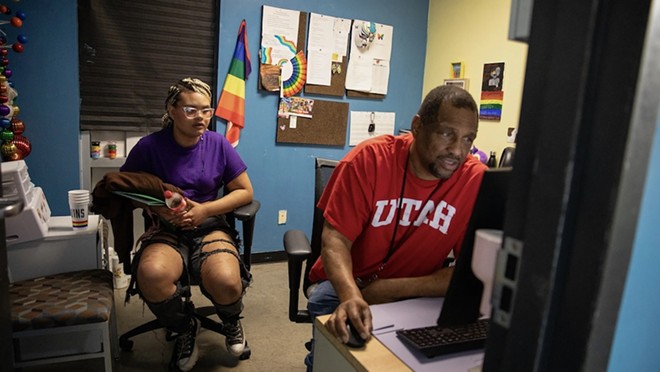
Texas Tribune / Greta Díaz González Vázquez
Isabella Morningstar talks with Marcus Anthony, a case supervisor at Thrive Youth Heart in San Antonio as he appears to be like for an replace on her new beginning certificates. After she aged out of the foster care system in 2020, she had a troublesome time updating her paperwork to mirror her authorized identify and gender marker.
Join The Temporary, The Texas Tribune’s day by day publication that retains readers in control on probably the most important Texas information.
It was close to midnight only a couple days earlier than Thanksgiving 2020 when 17-year-old Kayden Asher arrived at yet one more momentary house throughout his yearslong tumble via Texas’ chaotic foster care system.
His caseworker had given him simply two hours to pack his baggage earlier than they drove into the evening from a short-term shelter in South Texas to a nondescript constructing in Austin the place foster children in want of emergency shelter can stay briefly. When Asher arrived, the workers pulled him apart to ask some questions.
“What are your pronouns? Do you’re feeling protected speaking about being trans round your caseworker?” Asher recalled them asking.
After his father successfully disowned him years earlier for being transgender, Asher shuffled between caseworkers and momentary guardians. A lot of them additionally refused to simply accept his id — till he moved to Austin.
“It was the primary placement the place I felt accepted, and I felt I belonged,” mentioned Asher, now 20.
However within the years since Asher entered and exited the state’s care, LGBTQ+ foster children have misplaced the little protections and affirmations as soon as afforded to them as Texas’ prime leaders waged statewide battles that riled public panic about queer folks.
Research present LGBTQ+ children usually tend to grow to be wards of the state in contrast with their straight and cisgender counterparts. It’s not troublesome to think about why. Many queer youth enter the system for a similar causes their friends do: abuse, neglect or a guardian coping with habit. However many LGBTQ+ children additionally get rejected by their mother and father or run away from hostile properties.
But Texas’ Baby Protecting Providers doesn’t monitor the sexual orientation or gender id of youth in foster care. And as state leaders prioritized legislating every part from transgender children’ entry to sure well being care and the locations drag queens can carry out, in addition they quietly stalled efforts to higher practice adults charged with caring for trans foster youth.
“Proper now the governor and the Legislature would love nothing higher than to only have the ability to wash their palms of every part LGBTQ-related,” mentioned Sharon Fonvielle-Baughman, who abruptly retired because the Division of Household and Protecting Providers’ particular investigations director final yr.
After Kayden Asher advised his dad that he was transgender, their relationship fell aside and {the teenager} entered Texas’ troubled foster care system. As Asher tumbled via a number of foster placements, Texas leaders intensified their efforts to control the lives of LGBTQ+ folks. Credit score: Greta Díaz González Vázquez
Transgender foster youth now discover themselves concurrently residing within the care — and the crosshairs — of Texas’ conservative state authorities.
In an try to preserve youngsters from seeing lewd habits in public, shield parental rights and forestall so-called liberal indoctrination of children, Republican Texas officers lately have launched a litany of payments ensnaring how LGBTQ+ folks stay.
Trans Texans, although, say these makes an attempt additional marginalize an already weak a part of the inhabitants. And for trans individuals who age out of the foster care system, that sort of stigma worsens an already tenuous wrestle to construct an grownup life with out the sort of familial, monetary and social assist upon which most younger adults rely.
“Children usually are not political pawns,” Asher advised The Texas Tribune. “Children shouldn’t be used to attain political factors, particularly foster children, as a result of our lives are already crap.”
Texas has lengthy struggled to show round a foster system notoriously riddled with overmedication, neglect and abuse. A decide in 2015 decided Texas’ foster system leaves children worse off than once they entered it, kicking off years of federal oversight that persists. The instability of rising up in such an atmosphere will increase the dangers that folks find yourself homeless, grow to be victims of human trafficking and wrestle to acclimate to typical grownup life as soon as they age out of foster care.
For trans children who’ve been via the system, these odds solely develop. Analysis has proven that LGBTQ+ foster youth usually tend to stay in group house settings; continuously transfer between placements; report being hospitalized for emotional and bodily causes; and face mistreatment from friends and workers.
At DFPS, the state company tasked with caring for LGBTQ+ children, a hush-hush tradition has now taken root and unfold to organizations contracted to hold out its duties, in accordance with a number of present and former company staffers who requested that their identities be withheld as a result of they concern dropping their jobs or imperiling future alternatives to work in little one welfare in Texas.
The tradition of secrecy is just hurting LGBTQ+ foster youngsters who’ve already skilled trauma earlier than getting into state care, mentioned Krystal Mehrhof, a social employee with Central Texas Youth Providers who works with homeless youth.
“You can’t come to an individual who has this a part of their id that has considerably impacted their life and inform them, ‘Effectively we’re not going to speak about that,’” Mehrhof mentioned. “You’re asking them to both cover or deny a part of who they’re.”
DFPS declined to answer an inventory of questions for this story.
A cycle of chaos
Isabella Morningstar was 14 when her adoptive mom of practically a decade refused to let {the teenager} proceed residing together with her — a choice that kick-started a cycle of displacement. Over the next 4 years, Morningstar moved between over 20 placements: a foster house, psychiatric hospitals, emergency shelters and unlicensed services.
Employees at these placements typically refused to name Morningstar by her most popular identify or enable her to put on female garments. Greater than as soon as, she was kicked out of group properties for expressing her gender id.
“As soon as I found out I’m trans, I used to be like, ‘I’m not going to cover who I’m simply to please y’all. I don’t care if I’m in CPS,’” Morningstar mentioned in a current interview. “I’m nonetheless the identical individual I used to be yesterday. I’m nonetheless the identical individual I’m at the moment.”
However Morningstar hardly ever encountered acceptance in foster care. She remembers one workers member at an Amarillo facility telling her “that I’d find yourself on the streets or I am gonna find yourself laying on my again for cash, or lifeless.”
Over the following 4 years, the vitriol from adults who had been supposed to offer a protected and steady house conditioned Morningstar to count on folks round her would put in little effort to know her.
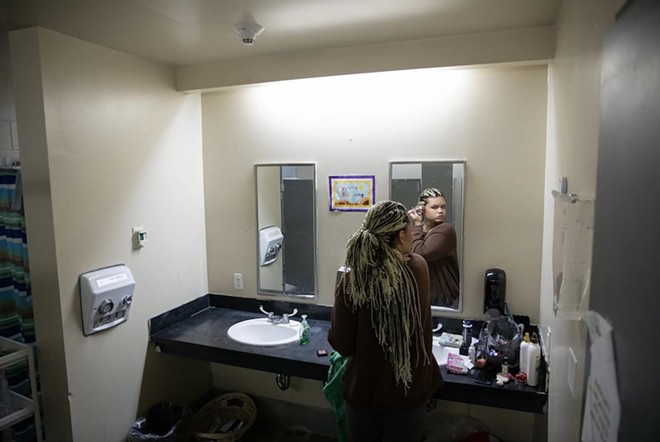
Texas Tribune / Greta Díaz González Vázquez
In November, Morningstar awakened early to prepare for the day. Earlier than enrolling in a cosmetology program at Palo Alto Faculty in San Antonio, she wanted to submit documentation to qualify for a scholarship. Foster youth in Texas are eligible for tuition waivers at choose state schools.
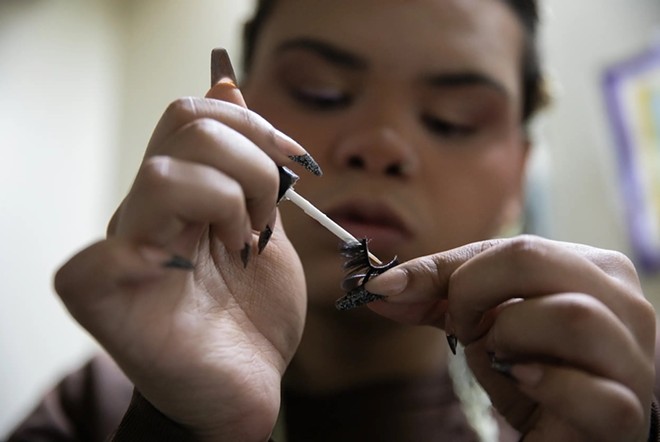
Texas Tribune / Greta Díaz González Vázquez
Morningstar places the ultimate touches on her make-up earlier than leaving Thrive Youth Heart in San Antonio. She needed to be snug in her gender expression for her first journey to Palo Alto Faculty in November. Whereas she was within the care of the Texas Division of Household and Protecting Providers, she wasn’t allowed to put on make-up or female clothes.
One facility in Houston refused to let Morningstar get her hair styled in the identical method cisgender women did. She was kicked out of properties for dressing femininely or having relationships with different adolescents residing at placements, although such romances had been widespread — however not trigger for self-discipline — for cisgender youth.
“The workers didn’t wish to cope with us so that they put us on a complete bunch of medication, so we had been quiet,” Morningstar mentioned.
The improper distribution of psychotropic medicine has been an ongoing part of a 13-year-old lawsuit in opposition to the state for violating the constitutional rights of foster youngsters by exposing them to an “unreasonable danger of hurt.”
Final week, a federal decide fined the Well being and Human Providers Fee, which oversees DFPS, $100,000 per day in fines for neglecting investigations into allegations of abuse of kids in foster care. An appeals court docket blocked the high-quality, however it was the third time the state has been present in contempt over foster care circumstances since 2011.
Throughout a listening to final yr, watchdogs appointed by a federal decide discovered that residential services — like those Morningstar lived in — did not observe the state’s tips for administering medicine and gave medicines to minors that are not really useful to youngsters.
Residential services are designed for youth with larger behavioral wants, like remedy and medicine, and are extra restrictive locations in contrast with personal foster properties. Much more confining are unlicensed properties like workplace buildings or lodges the place youth with no everlasting placement are despatched to sleep.
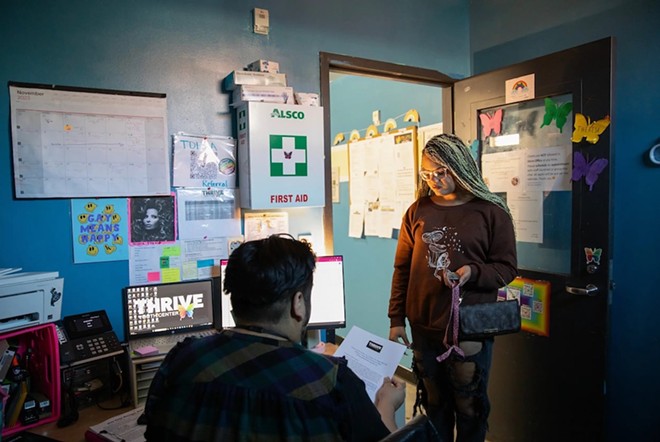
Texas Tribune / Greta Díaz González Vázquez
Morningstar speaks with Jai Gonzalez Quintero, a case supervisor at Thrive Youth Heart in San Antonio, earlier than leaving for the day. The nonprofit supplied academic and profession assist to Morningstar, together with sensible sources like bus passes. Credit score:
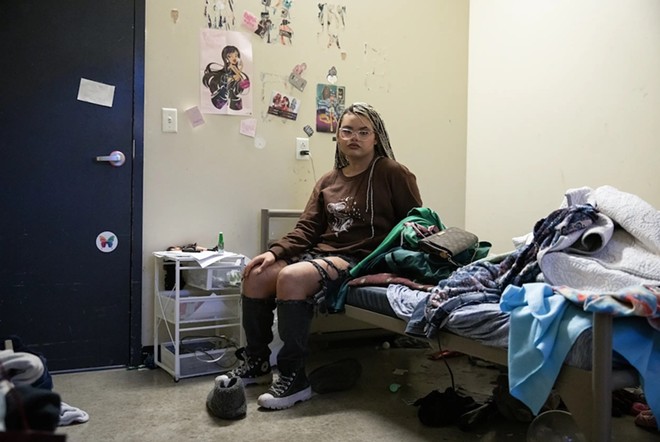
Texas Tribune / Greta Díaz González Vázquez
Morningstar, 22, poses for a portrait in her room at Thrive Youth Heart in San Antonio. Morningstar realized she was transgender whereas she was within the state’s troubled foster care system. “I’m not going to cover who I’m simply to please y’all. I don’t care if I’m in CPS,” she mentioned. Credit score:
Based mostly on conversations with 10 caseworkers, attorneys and advocates for foster youth who at present or previously labored in Texas, LGBTQ+ children are overrepresented in unlicensed properties as a result of much less restrictive placements can’t meet the wants of those younger people who find themselves attempting to carve out their identities.
Denise, a Houston-based DFPS caseworker who requested that her full identify not be used as a result of she fears retaliation, noticed firsthand how rejection from foster households and different adults tasked with caring for LGBTQ+ youth resulted in behavioral points. She mentioned these youth typically say disrespectful, hurtful issues and attempt to intimidate adults supervising them. She mentioned that very same habits prevents the youngsters from having the ability to discover a everlasting house throughout the foster system.
“When youth are misunderstood, they grow to be extraordinarily disrespectful as a result of that is the one energy that they’ve, it’s their solely space of management,” Denise mentioned.
Falling dominoes
Rising up in Beeville, a small city exterior Corpus Christi, Asher and his household knew everybody of their tight-knit, Christian neighborhood.
That made it all of the harder to maintain secrets and techniques from others on the town. Asher realized he was transgender when he was 13. His mother wasn’t within the image and he tried to cover it from his dad at first, however it continued gnawing at him till he couldn’t preserve it inside any longer.
When he advised his dad, the response was jarring.
“He was like, ‘Do not inform anybody, completely not. Do not inform your brother. Do not inform anybody,’” Asher mentioned.
Asher’s dad refused to come back to phrases with the truth that he had a trans son. Their relationship fell aside, and Asher’s psychological well being deteriorated with it.
Ideas of self hurt received so dangerous, Asher went to a psychiatric hospital. A physician noticed that Asher wasn’t depressed or threatening to hurt himself when he was away from house.
“CPS lastly took me as a result of my dad refused to have me at house,” Asher mentioned. “And I refused to go house.”
As Asher was waking as much as his id, politicians in Austin had been studying extra concerning the transgender neighborhood. Two years previous to Asher leaving house, lawmakers tried to limit the general public bogs trans folks can use.
The measure didn’t cross partially as a result of former Texas Home Speaker Joe Straus, a Republican, opposed the measure. However legislators did cross a legislation permitting non secular organizations that contract with the state to refuse to work with LGBTQ+ {couples} who’re looking for to foster or undertake. The laws was a part of a broader effort to fill gaps within the foster care system with the assistance of faith-based establishments.
That very same yr, DFPS quietly altered their Foster Care Invoice of Rights, a doc outlining how youngsters needs to be handled within the state’s care. The company, whose prime official is appointed by the governor, eliminated mentions of protections particular to gender id and sexual orientation. Now, Texas’ listing of rights for foster youth states all youngsters might be “handled pretty.”

Texas Tribune / Greta Díaz González Vázquez
Morningstar appears to be like on the bus route on her cellphone exterior a automobile dealership. Morningstar realized that touring round San Antonio utilizing public transit can take hours longer than driving. She took two buses and walked for 50 minutes to get to her faculty.
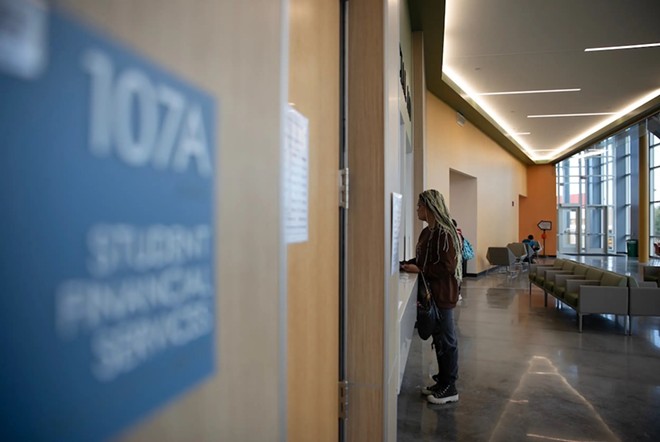
Texas Tribune / Greta Díaz González Vázquez
Morningstar drops off her documentation at Palo Alto Faculty’s monetary providers workplace. She has needed to leap via a number of hoops to entry monetary assist as a former foster youth as a result of her paperwork was underneath her identify given at beginning and never her present authorized identify.
“I believe that is the place the dominoes began to fall, I believe that is actually the place you began to see an lively assault on LGBTQ id,” mentioned Will Francis, the chief director of the Texas and Louisiana chapters of the Nationwide Affiliation of Social Staff.
When Asher entered the state’s care, like Morningstar, he cycled between foster properties, psychiatric hospitals and residential therapy facilities. As a rule, he discovered himself in conditions the place foster households and workers refused to name him by his most popular identify or acknowledge his trans id.
“I believe my greatest problem whereas I used to be in care was being listened to and being understood. No person desires to hearken to you,” Asher mentioned.
He mentioned that was very true of the faith-based placements that pushed church attendance on Asher and his friends.
That wasn’t the case at Lifeworks, the residential middle in Austin the place Asher was taken round Thanksgiving in 2020. When one other foster child bullied Asher for being trans, the workers instantly addressed the incident. He was additionally linked with a clinic the place he might start the method of medically transitioning via the usage of hormone therapy.
However whereas Asher was settling into his new life in Austin, lawmakers returned to the Capitol for the 2021 legislative session. They tried unsuccessfully to ban transition-related look after adolescents or classify it as little one abuse. Social employees rallied in opposition to the invoice that attempted to label such care as little one abuse, arguing that it might take away transgender youngsters from their properties and drive them into the foster care system.
Many trans folks expertise gender dysphoria, a dissociation between one’s intercourse assigned at beginning and their gender id. Transition-related care (additionally known as gender-affirming care) is a broad time period referring to a spread of social behaviors, psychological well being care and medical therapies that deal with gender dysphoria and assist an individual’s gender id.
The American Academy of Pediatrics says the some medical transition-related care can scale back misery in some transgender youth, who face increased charges of suicide makes an attempt and psychological well being issues than their cisgender friends. And medical professionals say trans children are solely supplied entry to puberty blockers or hormone remedy underneath the care of medical doctors and psychological well being care suppliers — and with the permission of their mother and father or authorized guardians.
For Asher, a transgender teenager already within the state’s care, the legislative debates had been perplexing. Two months earlier than his 18th birthday, whereas nonetheless in state care, he started taking testosterone.
After the payments died, Legal professional Basic Ken Paxton issued an opinion that transition-related surgical procedure, and nonsurgical remedies similar to puberty blockers and hormone remedy, needs to be thought-about little one abuse.
Seizing on that, Gov. Greg Abbott directed CPS to analyze for little one abuse the Texas mother and father with transgender youngsters who had been receiving gender-affirming therapy.
LGBTQ+ lawmakers requested to satisfy with then-DFPS Commissioner Jaime Masters over Abbott’s directive. However the company was prohibited from answering lawmakers’ questions over the matter, in accordance with inner emails. Company leaders suggested staffers to not put communications in writing and to solely focus on intakes associated to Abbott’s directive over the cellphone.
“No emails or texts allowed,” Patricia Salinas, then the Baby Protecting Investigations director for the company, wrote to DFPS workers.
Additionally in 2021, former state Sen. Don Huffines was difficult Abbott in his upcoming reelection and tried to out flank the incumbent on the suitable. Huffines blasted Abbott’s management by zeroing in on a DFPS webpage, titled Youth Connections, that supplied details about a suicide prevention hotline, LGBTQ+ authorized providers, and questions on defining gender and sexual id.
Contained in the company, staffers famous Huffines’ criticism was “beginning to blow up” on social media. They rapidly eliminated the Youth Connections web site.
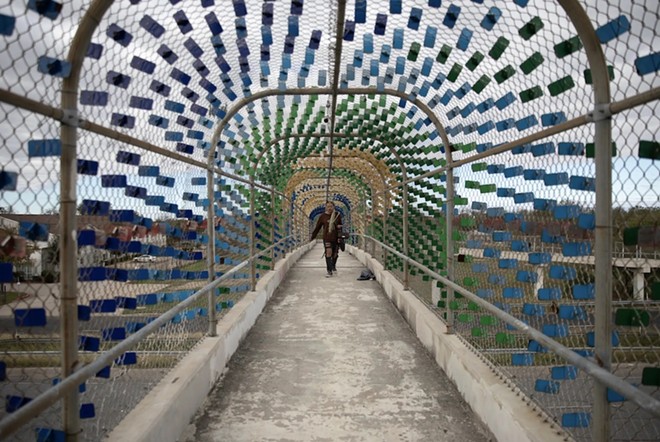
Texas Tribune / Greta Díaz González Vázquez
Morningstar walks to Palo Alto Faculty. Whereas she was within the state’s care, Texas eliminated the few affirmations and protections supplied foster youth based mostly on their sexual orientation and gender id. Years later, DFPS eliminated a web page on the company’s web site that listed sources for LGBTQ+ youth in care, together with a suicide hotline.
Aged out and alone
After Morningstar aged out of foster care in 2020, she struggled to discover a steady place to stay. She needed to stay on her personal however couldn’t safe housing with out assist, so she moved in together with her beginning mother and stepdad within the Panhandle.
The temporary interval of stability went out the window after a couple of years as a consequence of mistreatment by her household forcing her to maneuver out. She shuffled between momentary housing and lodges till final yr, when she was linked to Thrive Youth Heart, a nonprofit that gives housing for LGBTQ+ younger people who helped Morningstar relocate to San Antonio.
“I wasn’t given any assist after I aged out. I wasn’t given any cellphone quantity to assist me in any respect,” Morningstar mentioned. “It was simply, ‘There you go, you are not part of CPS anymore.’”
Staying there meant she had a curfew and restrictions on what she might carry into the ability, like meals and drinks. However employees supplied academic and profession assist to residents, together with sensible sources like bus passes.
About half of the youth that Thrive serves are former foster youth, Jenny Hixon, who ended her tenure because the nonprofit’s govt director final week, advised the Tribune. She mentioned lots of the trans residents are skeptical of psychological well being providers supplied by the nonprofit as a result of the therapists they had been compelled to see whereas they had been wards of the state didn’t affirm their gender identities.
The youth Thrive works with, Hixon mentioned, typically bounced round establishments the place they didn’t construct a robust relationship with a main caregiver, so many by no means realized fundamental expertise wanted to stay independently.
“No person finally ends up on the road if that they had a stable, nice house atmosphere,” Hixon mentioned.
Regardless of not having that steady basis, Morningstar is attempting her finest.
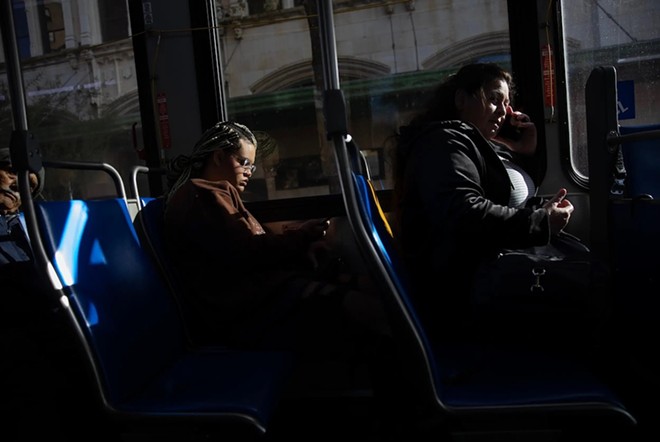
Texas Tribune / Greta Díaz González Vázquez
Over the 4 years Morningstar was within the state’s care, she lived in over 20 completely different placements, together with psychiatric hospitals and unlicensed services. Present and former caseworkers and attorneys who labored with foster youth advised The Texas Tribune that LGBTQ+ children are overrepresented in unlicensed properties as a result of much less restrictive placements typically can’t meet the wants of those younger folks.
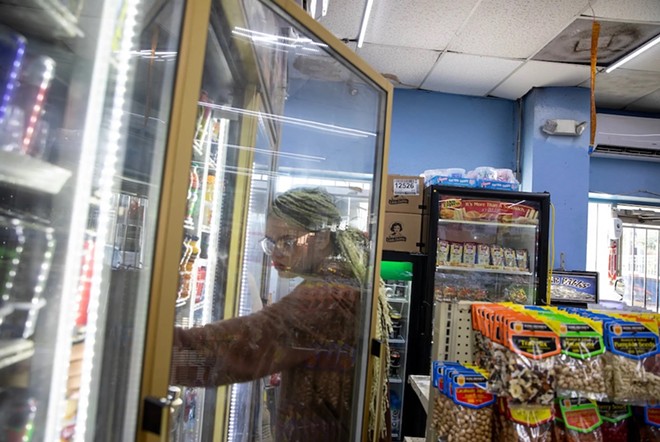
Texas Tribune / Greta Díaz González Vázquez
Morningstar stops at a comfort retailer to purchase meals earlier than taking the bus. “I wasn’t given any assist after I aged out. I wasn’t given any cellphone quantity to assist me in any respect,” Morningstar mentioned.
One morning final yr, she awakened at 5 a.m. to placed on her make-up and prepare for the day. She needed to look good and be snug in her gender expression for her first journey to Palo Alto Faculty, the place she’s going to begin a cosmetology program this summer time.
She wanted to offer the college with documentation to qualify for a scholarship. After two buses and a 50-minute stroll to the faculty, Morningstar realized she might have simply emailed the paperwork.
“We’re ranging from the bottom up with a few of these children, they don’t know learn how to use a can opener,” Hixon mentioned. “Staple items that you’d assume most 18-year-olds would know, and so they don’t know.”
An absence of coaching
As Republican lawmakers had been wading into transgender politics roughly seven years in the past, there was momentum amongst advocates who labored with foster youth to enhance outcomes from LGBTQ+ adolescents within the state’s care.
Eight years in the past, Denise, the Houston caseworker, acquired coaching on learn how to look after LGBTQ+ youth. She lauded the coaching — and listening to the experiences of transgender youth she labored with. Each helped her higher perceive trans children, one thing she mentioned is essential so the youth can open up and construct belief with the grownup tasked with caring for them.
“And if that caseworker will not be educated for that, oh my goodness, you may find yourself with a baby on the streets … human trafficked, drug use, main despair,” Denise mentioned.
For years, an meeting of kid welfare stakeholders tried to get DFPS to approve a useful resource information that may assist adults discover ways to higher look after LGBTQ+ youth.
“You’ll have a house that’s in flat tire Texas and does not essentially have a number of expertise working with a queer child, and impulsively, they’ve a queer child and wish to be that supportive placement for them,” mentioned Francis, the regional Nationwide Affiliation of Social Staff chief who helped put together the LGBTQ+ Baby Welfare Useful resource Information. “We wrote that as a result of DFPS was doing nothing.”
In Could 2020, the LGBTQ+ Baby Welfare Workgroup — made up of social employees, attorneys and little one advocates who work with Texas foster youth — despatched Masters, the DFPS head on the time, a draft of the information. However for over two years, the draft sat untouched. Stephanie Muth changed Masters as head of the company in November 2022. So far as Francis is aware of, the company nonetheless hasn’t taken steps to approve the useful resource information, although there are related guides for youth with disabilities or substance abuse points.
DFPS declined to answer an inventory of questions concerning the useful resource information and different insurance policies the company has in place to coach workers on learn how to work with LGBTQ+ children.
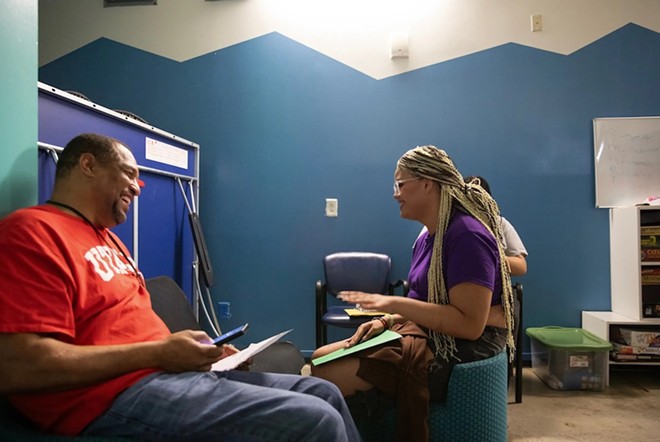
Texas Tribune / Greta Díaz González Vázquez
Morningstar and Anthony snigger collectively after she returns from an extended day traversing San Antonio. After telling Anthony about her day, Morningstar mentioned, “I did every part on my own, like an enormous lady.”
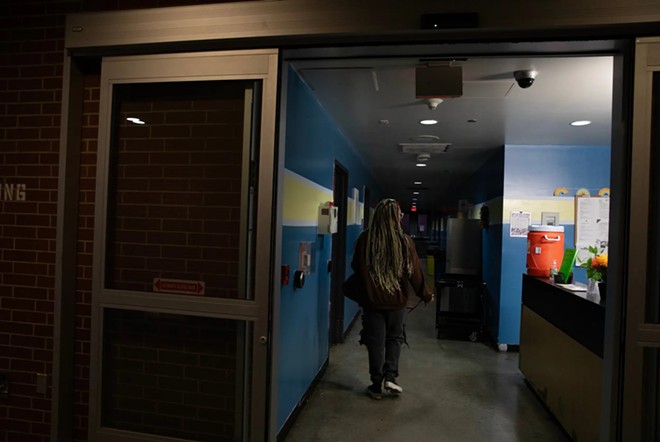
Texas Tribune / Greta Díaz González Vázquez
After a complete time out within the metropolis, Morningstar lastly makes it again to the dorms at Thrive. She mentioned that in her time within the foster care system, she wasn’t allowed to be round different LGBTQ+ youth, however at Thrive Youth Heart, she made good buddies.
And it’s evident that suppliers aren’t wanting to take a public stance on how finest to look after foster children who’re LGBTQ+. Of the seven suppliers tasked with managing little one welfare for areas of the state — as a part of Texas’ most up-to-date effort to overtake the foster care system — solely three supplied a touch upon the difficulty. Solely a type of talked about the presence of LGBTQ+ adolescents of their care.
“We prioritize the inclusivity of all of the youth underneath our care, together with those that establish as LGBTQ+,” Denny Marlin, the chief director of selling and communications for Saint Francis Ministries, mentioned in a press release.
Adam McCormick, an affiliate professor of social work at St. Edward’s College in Austin, has performed tons of of interviews with foster alumni. He mentioned the state has systematically eradicated a assist system for these children who’re already combating the ache of rejection from their households.
“I believe that is the largest indictment of the Texas foster care system. LGBTQ younger persons are ageing out of care and most of them don’t also have a single individual, not to mention a strong assist system, who they’ll rely on,” McCormick mentioned. “It’s a kind of loneliness in contrast to something I’ve seen.”
Constructing a life
As soon as Asher turned 18, he left state care and moved right into a shelter for younger adults run by SAFE Alliance, a nonprofit that serves victims of abuse. In 2022, SAFE Alliance’s supervised impartial residing program helped him transfer into his personal house.
It was there that Asher watched as lawmakers once more focused LGBTQ+ folks — and made it unlawful for trans children to obtain puberty blockers and hormone remedy. Regardless of pushback from a number of main medical teams, conservative legislators mentioned the legislation was wanted to guard youngsters, whom they claimed had been being influenced into receiving transition-related care.
Whereas GOP officers within the state proudly stand behind the current slate of payments focusing on the LGBTQ+ neighborhood, Straus, the previous Home speaker who as soon as helped stall such laws, not too long ago emerged as a lonely dissenter.
“Why is it such an obsession?” the Republican mentioned in an interview on the LBJ Faculty of Public Affairs earlier this month. “Time and time once more, they attempt to discover some area of interest factor they assume will play nicely within the main when, for my part, it is rooted in simply plain indecency.”
Asher mentioned it’s grow to be pressing for him to advocate for LGBTQ+ foster youth.
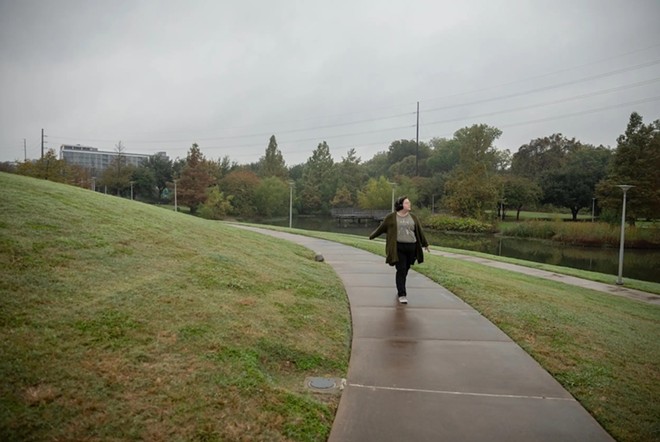
Texas Tribune / Greta Díaz González Vázquez
Asher walks in a park close to downtown Austin final yr. Earlier this yr, Asher moved in along with his adoptive mother and father, whom he met whereas advocating for LGBTQ+ folks on the Texas Capitol in 2021. He plans to stick with his household via his commencement in August.
He pursued a level in paralegal research at Austin Neighborhood Faculty, partially, as a result of this system is authorised by the American Bar Affiliation, so he has a great likelihood of securing a full-time job after graduating in August. He desires to work with children like himself, who’re caught within the whirlpool of the Texas foster care system.
“Being a foster child and being queer are each very large elements of my life,” Asher mentioned. “And I wish to work and assist folks in each of these conditions.”
In February, Asher moved in along with his new adoptive mother and father, whom he met whereas advocating for trans folks on the Texas Capitol in 2021. He plans to stick with his adoptive household till he graduates. As Asher tries to determine learn how to construct a life — and assist others — he holds tightly to a lesson he realized within the foster care system.
“It’s important to put your self first as a result of no person else goes to maintain you protected,” he mentioned.
This story was accomplished with the assist of a fellowship from Columbia College’s Ira A. Lipman Heart for Journalism and Civil and Human Rights.
Disclosure: College of Texas at Austin – LBJ Faculty of Public Affairs has been a monetary supporter of The Texas Tribune, a nonprofit, nonpartisan information group that’s funded partially by donations from members, foundations and company sponsors. Monetary supporters play no function within the Tribune’s journalism. Discover a full listing of them right here.
This text initially appeared within the Texas Tribune.
The Texas Tribune is a member-supported, nonpartisan newsroom informing and interesting Texans on state politics and coverage. Study extra at texastribune.org.
Subscribe to SA Present newsletters.
Observe us: Apple Information | Google Information | NewsBreak | Reddit | Instagram | Fb | Twitter| Or join our RSS Feed





